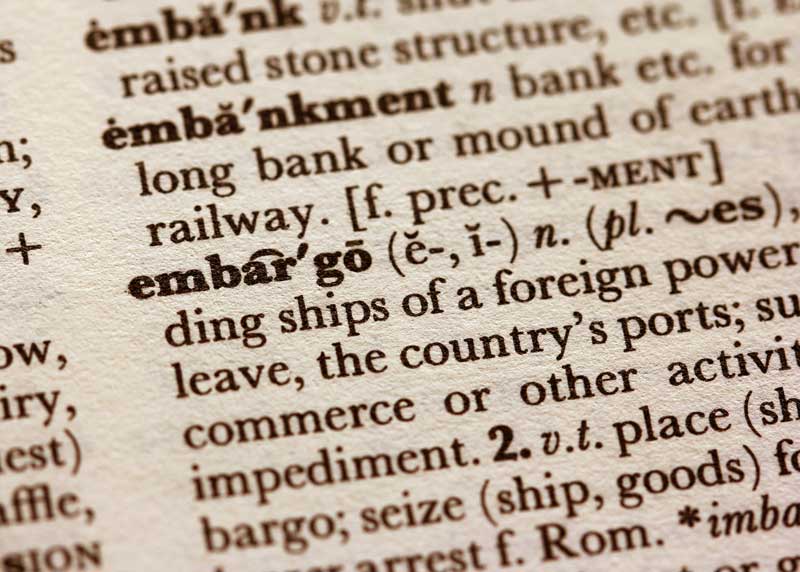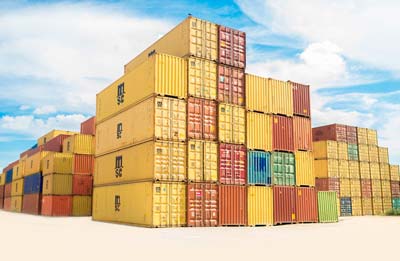Popular Terms and Definitions for African E-Logistics and Trade Financing - TRAGOA
Understanding Popular Terms in African E-Logistics, Importing/Exporting, and Trade Financing
TRAGOA Trading 3/21/23

As an African B2B business involved in importing, exporting, or brokering to, from, or within Africa, you may encounter a variety of terms related to e-logistics and trade financing. Understanding these terms can help you navigate the complex landscape of international trade and ensure the success of your business. Here are some of the most popular terms and their definitions:
African E-Logistics & Logistics
- Air Freight: The transportation of goods by air, usually via a commercial airline or a dedicated cargo airline.
- Ocean Freight: The transportation of goods by sea, usually via a cargo ship or a container ship.
- Freight Forwarder: A company that arranges the transportation of goods on behalf of a shipper, including booking cargo space, preparing documentation, and arranging for cargo pickup and delivery.
- Cargo Consolidation: The process of combining multiple shipments into a single container or shipment to reduce shipping costs.
- Cargo Insurance: Insurance that covers the loss or damage of cargo during transit.
- Customs Broker: A professional who assists with customs clearance by preparing and submitting documents to government agencies.
- Warehousing: The storage of goods in a warehouse or distribution center.
- Inventory Management: The tracking and control of inventory levels to ensure optimal stock levels and minimize waste.
- Africa Customs Union This is a regional agreement among African countries that aims to promote trade and economic integration by eliminating trade barriers such as tariffs and quotas on goods traded within the union. The Africa Customs Union is a key component of the African Continental Free Trade Area (AfCFTA).
- Bonded Warehouse This is a secure facility that is authorized by customs authorities to store imported goods that are awaiting clearance. A bonded warehouse allows businesses to defer the payment of duties and taxes until the goods are released for sale or export.
- Customs Broker This is a professional who specializes in customs regulations and procedures and acts as an intermediary between importers or exporters and customs authorities. A customs broker can assist with tasks such as completing customs documentation, paying duties and taxes, and arranging for the release of goods from customs.
- Demurrage This is a charge levied by carriers (shipping lines or airlines) for the detention of a container or cargo beyond the allotted free time at a port or airport. Demurrage charges can be significant, so it is important for importers and exporters to plan their logistics carefully to avoid unnecessary delays.
- Free Trade Agreement (FTA) This is a regional agreement between countries that eliminates or reduces tariffs and other trade barriers on goods traded within the agreement. FTAs are designed to promote trade and economic integration among participating countries.
- Hazardous Materials (HAZMAT) These are goods that are potentially dangerous or harmful to people, property, or the environment. Examples of HAZMAT include chemicals, explosives, and radioactive materials. The transportation of HAZMAT is subject to strict regulations and requires specialized handling and documentation.
- Shipping Agent This is a person or company that acts as an intermediary between the carrier (shipping line or airline) and the shipper (exporter or importer) for the transportation of goods. A shipping agent can assist with tasks such as booking cargo space, arranging for transport, and preparing documentation.
African Trade Financing
- Letter of Credit: A financial document issued by a bank that guarantees payment to a seller if certain conditions are met.
- Factoring: The process of selling accounts receivable to a third party in order to receive immediate cash.
- Forfait This is a French term used in trade financing that refers to a financing arrangement where the exporter (seller) receives payment immediately from the financier and transfers the credit risk to the financier. In this arrangement, the exporter may receive payment before or after the shipment of goods.
- Logistics Portal This is a web-based platform that provides access to various logistics services such as freight forwarding, warehousing, transportation, and customs clearance. A logistics portal helps businesses to manage their supply chain operations more efficiently by providing them with real-time tracking and tracing, inventory management, and other logistics-related information.
- Africa Logistics Company This is a company that specializes in providing logistics services in Africa. An Africa logistics company may provide services such as freight forwarding, customs clearance, warehousing, and transportation. These companies have a deep understanding of the African market and are equipped with the necessary resources and expertise to navigate the complexities of the African logistics landscape.
- Africa Supply Chain This refers to the sequence of activities involved in the production and distribution of goods and services in Africa. The African supply chain involves various stakeholders such as manufacturers, distributors, retailers, and logistics providers. A well-optimized supply chain can help businesses to reduce costs, improve efficiency, and enhance customer satisfaction.
- Air Waybill (AWB) This is a document that serves as a contract between the shipper (exporter) and the carrier (airline) for the transportation of goods by air. An Air Waybill contains information such as the origin and destination of the shipment, the weight and volume of the goods, and the terms and conditions of the transport.
- Bill of Lading (B/L) This is a document that serves as a contract between the shipper (exporter) and the carrier (shipping line) for the transportation of goods by sea. A Bill of Lading contains information such as the origin and destination of the shipment, the type and quantity of the goods, and the terms and conditions of the transport.
- CIF (Cost, Insurance, and Freight) This is a pricing term used in international trade that includes the cost of goods, insurance, and freight charges up to the port of destination. CIF is used primarily in maritime transport.
- FOB (Free on Board) This is a pricing term used in international trade that includes the cost of goods and loading charges up to the point of shipment. FOB is used primarily in maritime transport.
- Incoterms These are a set of international commercial terms that define the rights and obligations of the buyer and seller in a sales contract. Incoterms specify the responsibilities for the delivery of goods, transport costs, insurance, and customs formalities.
- Letter of Credit (L/C) This is a financial instrument used in international trade that provides a guarantee of payment from a bank to a seller. A Letter of Credit ensures that the seller will receive payment upon the shipment of goods as long as they comply with the terms and conditions specified in the L/C.
- Trade Finance This refers to the financing of international trade transactions. Trade finance may include various financial instruments such as letters of credit, bank guarantees, export credit insurance, factoring, and forfaiting. Trade finance helps businesses to manage the risks and costs associated with international trade.
- Incidentals This refers to expenses incurred during the transport of goods that are not included in the basic freight rate. Examples of incidentals include handling charges, terminal fees, and customs brokerage fees.
- Insurance Certificate This is a document that provides proof of insurance coverage for goods being transported. An insurance certificate may be required by customs authorities or other parties involved in a trade transaction.
- Perishable Goods These are goods that have a limited shelf life and require special handling and transport conditions to maintain their quality and freshness. Examples of perishable goods include fresh produce, flowers, and pharmaceuticals.
Conclusion
In conclusion, navigating the complex world of trade financing and logistics can be challenging, especially for businesses operating in Africa. However, with the right knowledge and expertise, it is possible to succeed and thrive in the African market. TRAGOA is an excellent platform that provides businesses with the necessary tools and resources to import, export, and brokering to, from, and within Africa. By utilizing TRAGOA's partnership with Jetstream Africa, businesses can easily access trade financing and e-logistics services. Register for TRAGOA for free today and discover how easy it can be to ship to and from Africa!
Recent Blog Posts
Shipping Cargo and Freight To, From, and Within Africa - TRAGOA
Learn how to ship cargo and freight to, from, and within Africa. Register for TRAGOA to simplify your shipping process to, from, and within Africa.TRAGOA is the leading African B2B marketplace that offers B2B services, and trade financing / e-logistics through a partnership with Jetstream Africa to simplify your shipping process to and from Africa. By signing up for TRAGOA for free, you'll gain access to a vast network of verified buyers and sellers, competitive shipping rates, and expert guidance on customs clearance and documentation. Click to read more about how TRAGOA can help you ship to and from Africa with ease.
by TRAGOA Trading, 3/27/23
Read more
How to Become an Import and Export B2B Broker in Africa - TRAGOA
Brokering in Africa: A Beginner's Guide with TRAGOAAre you interested in starting your own import/export brokering business in Africa? TRAGOA, the top African B2B marketplace eCommerce platform, can help you get started. With our range of services and tools, you can connect with suppliers and buyers across Africa and around the world. Register for free today and start learning how to become an import and export broker in Africa, and read more about the tips and tricks of successful brokering.
by TRAGOA Trading, 3/21/23
Read more
A Comprehensive Guide to African Cargo Shipping Using E-Logistics and Trade Financing Options
Efficiently Ship Your Cargo To, From, and Within Africa with E-Logistics and Trade Financing for African B2B Businesses.Importing, exporting, and shipping cargo to, from, and within Africa can be a complex process, but with the right tools and strategies, businesses can manage their supply chains more efficiently, reduce costs, and expand their operations. In this blog post, we explore the use of e-logistics and trade financing options to help businesses ship cargo to and from Africa. From choosing a reliable e-logistics provider to understanding local regulations, we provide tips and insights to ensure a successful shipment. To learn more about how TRAGOA.com can assist with importing, exporting, and brokering to, from, and within Africa, and to request a quote for logistics and trade financing, click to read more and register on our website today.
by TRAGOA Trading, 3/14/23
Read more
E-Logistics and Trade Financing for African B2B Businesses - TRAGOA.com
The Importance of E-Logistics and Trade Financing for African B2B BusinessesAfrican B2B businesses face unique challenges when it comes to logistics and trade financing due to the continent's complex and diverse market. E-logistics and trade financing are essential components of modern business operations and can help businesses manage their supply chains more efficiently, reduce costs, and expand their operations. TRAGOA.com, the top African B2B marketplace eCommerce platform, has partnered with Jetstream Africa to provide comprehensive e-logistics and trade financing solutions to African businesses. To learn more about how TRAGOA.com and Jetstream Africa can help your business on TRAGOA.com, read the full blog post and register for free on TRAGOA.com today.
by TRAGOA Trading, 3/10/23



